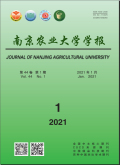南京农业大学学报2024,Vol.47Issue(2):264-273,10.DOI:10.7685/jnau.202307009
水产养殖废水灌溉耐盐水稻对土壤和植物的影响
Effects of irrigation of salt-tolerant rice with aquaculture wastewater on soil and plant
摘要
Abstract
[Objectives]Aquaculture wastewater can be used as an alternative water source for agricultural irrigation.The purpose of this study was to analyze the effects of irrigation of saline-alkali tolerant rice with different concentrations of aquaculture wastewater on soil,plant and ecological economic benefits.[Methods]Salt-tolerant rice was used as the test plant for pot experiment.By setting freshwater and aquaculture wastewater(V∶V=1∶1)(DY)and aquaculture wastewater(Y)irrigation treatments,and freshwater(D)irrigation was used as the control to monitor the changes of soil physical and chemical properties,the growth and yield of saline-alkali tolerant rice.Based on this,the ecological economic benefits value generated by aquaculture wastewater irrigation of saline-alkali tolerant rice was calculated combined with the evaluation method of paddy field ecosystem services.[Results]The irrigation of aquaculture wastewater could reduce the soil pH value and increase the soil electrical conductivity(EC),while the aquaculture wastewater could improve the physical properties of the soil,reduce the bulk density of the soil,improve the porosity of the soil,and improve the water holding status of the soil.Aquaculture wastewater irrigation could increase soil organic matter,total nitrogen,total phosphorus and available phosphorus contents in different degrees,and improve soil fertility.Compared with D irrigation,DY could effectively increase the height of saline-alkali tolerant rice,increase the biomass of saline-alkali tolerant rice,improve the yield of saline-alkali tolerant rice,and increase the yield by 199%.The ecological economic benefits generated by the three treatments were DY irrigation(30 532.08 yuan·hm-2),Y irrigation(20 980.63 yuan·hm-2),and D irrigation(13 208.60 yuan·hm-2)in the order of size.[Conclusions]Freshwater and aquaculture waste water(1∶1)could improve the physical and chemical properties of the soil,increase soil fertility,and crop yield,and bring greater ecological economic benefits value,which was the best irrigation mode.关键词
水产养殖废水/灌溉/耐盐水稻/生态经济效益Key words
aquaculture wastewater/irrigation/salt-tolerant rice/ecological economic benefits分类
资源环境引用本文复制引用
张稳乐,罗朝晖,吕璐皞,江雨萌,赵海燕,陈丹..水产养殖废水灌溉耐盐水稻对土壤和植物的影响[J].南京农业大学学报,2024,47(2):264-273,10.基金项目
国家重点研发计划项目(2020YFD0900703) (2020YFD0900703)

